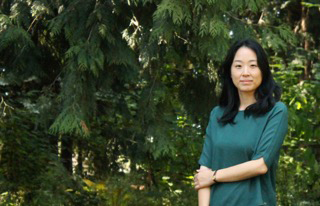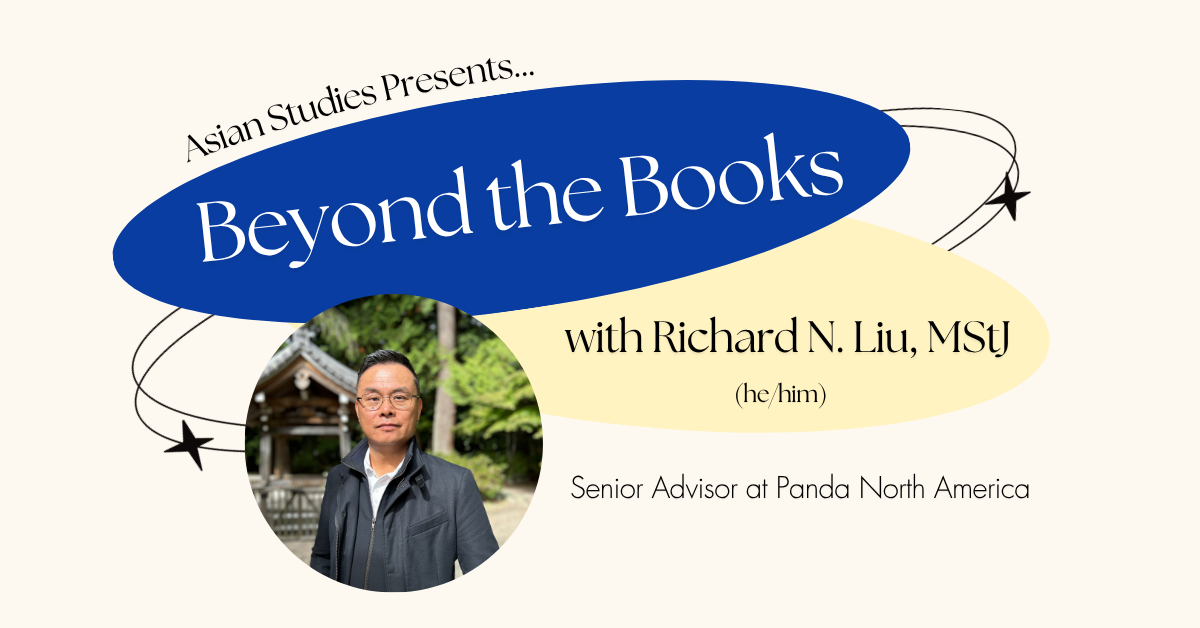Interested in pursuing an MA or PhD in Asian Studies? In this interview series, we ask our graduate students about their research, their experience in our program and their future academic and professional goals. This interview features PhD student Minami Orihara. Minami’s research focuses on Japanese Social History.


Tell us a little about yourself, your background and how you became interested in Asian Studies?
My interest in Japanese history developed during my time in Singapore. I was born and raised there after my parents moved from Japan for my father’s job. There is a very large and secluded Japanese community in Singapore, and I initially attended a school set up for the children of Japanese expatriates. I eventually left this school for an international school where I found myself to be the only student from Japan in some classes, and later pursued my M.A. in history at the National University of Singapore before coming to Canada.
It was through my interactions with friends and teachers in these three different schools that I gradually came to gain a sense for the presence of diverse narratives on Japanese aggression in Singapore, became aware of the challenges a historian faces, and shaped subjective motives for doing and teaching history. Having said that, the decision to do PhD-level research did not come immediately; it took me some time of wondering and wandering (including working in the corporate world and failing at it!)
During my time at NUS, I researched on topics dealing with millenarian movements led by young radicals and the relevant state programs of thought control in prewar and wartime Japan. Since then my interests have drifted toward the social history of early modern Japan, but I continue to use the accounts of rebels and those on the social periphery to gain a better understanding of Japan.
Why did you choose the Asian Studies program at UBC? Was there an aspect of the program or location that was particularly attractive to you compared to other programs in Canada or internationally?
My decision to come to UBC was somewhat intuitive. Of course, I contacted a couple of potential advisers, read their publications, and pictured how it would be to work with each of them. Positive correspondence with my current adviser, Dr. Nam-lin Hur, and UBC’s Asian Library stood out, but it was difficult to get a full grasp of what I could expect in a place half way around the globe. In the end, I just opened myself to chance encounters.
It was through one of such experiences that I came across the material of my dissertation topic. It can be a long and sometimes anxious process before one finds his/her research focus, but I was very fortunate to receive the support I needed from people I met in this department during that trajectory. In addition to Dr. Hur, Dr. Peter Nosco and Dr. Jessica Main have offered me the training I needed to engage in a wide array of historical sources and questions. I also feel fortunate to have Shirin Eshghi and Naoko Kato, librarians at the Asian Library. They ensure that my research process is smooth and comprehensive with the assistance they offer.
Could you explain to a non-expert what you are researching and why it is important?
My dissertation involves an examination on the evolution of trust and cooperation in Tokugawa Japan. It is often suggested in historical literature that Japanese people hold harmony and group conformity in high regard; I use what I call Bonds of Trust (tanomi shōmon), Tokugawa-period agreements, to study the mechanisms and guiding principles that buttress social cohesion. I was able to collect nearly seven hundred of them thanks to the help of wonderful historians in Japan.
The Bonds of Trust were written promises primarily used to elicit and sustain cooperation within a group of Tokugawa peasants when they stood in resistance to their competing groups and samurai feudal rule. Divine oaths (kishōmon) traditionally filled that role by using the threat of divine punishment as a deterrent to defection, but I argue that the Bonds of Trust emerged as a secular institution for meting out long-term rewards such as trustworthy reputation.
In my dissertation, I trace the development of these contracts from their rise in dominance over the medieval covenant with Buddhas and deities at the beginning of the seventeenth century, and through their vogue during the rise of market growth, social movements, and the sentiments of distrust toward the end of the feudal rule in the late nineteenth century. In doing so, I address trust as the key element for overcoming dilemmas of collective action, strong economic growth, the establishment of Japanese-type civil society, and the rise of democratic institutions.
As a graduate student, what are your main activities?
I’ve spent the past few years collecting, studying, and classifying the primary documents, and I now devote my time to writing and polishing my dissertation. I hope I can prepare one of the chapters for publication before my graduation. I am also scheduled to teach ASIA346 in Term 2 of the 2017W, so planning for the new syllabus is on my mind these days. When I am not teaching history courses as a sessional instructor, I usually work as a Teaching Assistant for Japanese language courses.
What has been the most memorable or impactful moment of your graduate experience?
One of the memorable moments in my graduate career is having had the chance to teach an undergraduate course on Tokugawa history for the first time. The experience forced me to ask fundamental questions about the kind of teacher I want to become and the style of teaching I still need to develop. It also created an opportunity to deepen my appreciation for people working in the department. My daughter was 8 months old at the time, and the lack of daycare spaces has posed a major challenge to two aspiring PhD’s in the family. Our department administrator, Maija Norman, made the arrangements that best suited our teaching schedule. I was also touched by the genuine kindness I felt from Jasmina Miodragovic, Shirley Wong, and the other staff in the office whenever I stopped by.
What are your goals (career or academic) once you’ve completed the program? And how is our program helping you achieve them?
I usually try to undertake each challenge with the mentality of “Bloom where you are planted”. My goal is to continue researching and teaching wherever that may be and make the best of the given situation.
I applied for one tenure-track position two years ago, and the support I received from the faculty members was immensely helpful. In addition to my adviser, Dr. Stefania Burk and Dr. Sharalyn Orbaugh each read my application package multiple times. Before a scheduled Skype interview, Dr. Burk and I sat before our computers for a mock interview.
Can you give any advice to new students in our program or for students considering applying to it?
This is the hardest question of this interview. I think what has compelled me in my pursuit was the very subject matter of my research. Again, it can be a slow process before you find a story you care for deeply. In some cases, a relevant archival material is brought to your attention by sheer luck. Although there are specific deadlines and expectations we must meet, I try to remind myself that one dimension of my career as a graduate student involves waiting—that new discoveries and original ideas can only spring from day-to-day training and preparation no matter how insignificant or mundane some of it may feel at times. In my case, I also had to put my studies on hold for two years. I’ve therefore come to this general mindset, but each has his/her own. It helps to talk to others both inside and outside academia. Inspirations and motivations could be brought to you from places you never expected.


